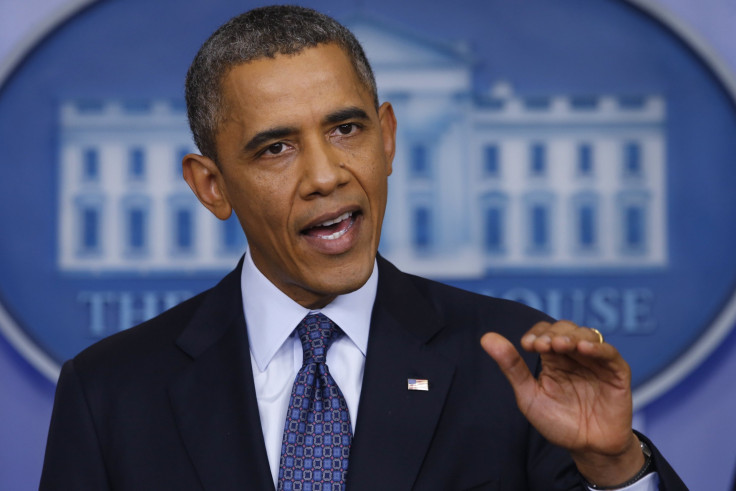Debt Ceiling 2013: Obama Refuses To 'Make Extortion A Routine Part Of Our Democracy'

President Barack Obama said he is yet to hear a “serious position” from the Republicans regarding solving the nation’s budget problems. But with a government shutdown now in its second week and the U.S. creditworthiness on the line, the president refused to “pay a ransom” for settling the nation’s bills.
“We can't make extortion routine as part of our democracy,” Obama said during a press conference on Tuesday. “We gotta put a stop to it.”
Obama said Congressional Democrats have tried 19 times to go to conference with Republicans on budget bills passed earlier this year, but were rejected each time. But as the first government shutdown in 17 years continues, and America careens toward the Oct. 17 deadline for raising the near $17 trillion debt ceiling, there is slight movement on the part of the president, who said he’s willing to accept a short-term budget that reopens the government at current funding levels of about $988 billion.
The president’s press conference came after speaking with House Speaker John Boehner, R-Ohio, by telephone on Tuesday morning and an unfruitful meeting last week with congressional leaders. In both, Obama urged the speaker to vote on the resolution to reopen the government with no strings attached. Each side refused to change course -- Obama and Democrats unwilling to accept measures with anti-Obamacare amendments (and disinclined to talk with Republicans until the government opens), while Republicans are reluctant to pass bills that don’t contain language that defunds the health-care law.
“The way we got to this point was one thing and one thing only, was Republicans’ obsession with Obamacare and denying health insurance to people,” Obama said. “That law, ironically, is moving forward.”
With Democrats having accepted a bill that funds the government at sequestration levels, Obama said it’s a sign of “ample willingness to talk about any issue Republicans want to talk about.”
“Let’s stop the excuses,” he said. “Let’s take a vote in the House. Let’s end this shutdown right now and put people back to work. ... That vote could take place today. Shutdown would be over.”
About 800,000 workers have been furloughed and several agencies partially shut down because of the funding lapse. Still. Boehner said he will not increase the debt limit until Democrats have a “serious conversation” with Republicans.
“Refusing to negotiate is an untenable position,” Boehner told The New York Times. His office also told the paper that the president’s call changed nothing, as Obama was still refusing to negotiate a funding bill or the debt limit increase.
Economists and think tankers say a U.S. default could have global consequences. But some Republicans remain skeptical of the default, saying the Treasury can prioritize its payments. Obama reminded them that the last time the U.S. flirted with default, in 2011, the markets plunged and the U.S. credit rating got downgraded.
The president said a decision to go through with default would be “insane,” “catastrophic,” and lead to “chaos.”
“There’s nothing fiscally responsible about that,” he said. “Preventing this should be simple.”
“We’re not going to calm creditors until they see Speaker Boehner call up a bill that reopens the government and authorize the secretary of the treasury to pay our bills on time,” he added.
After Obama's press conference, Boehner responded, calling the president's wanting to negotiate only after the fact amounts to “unconditional surrender.” The speaker also issued a challenge of his own saying, “There’s going to be a negotiation here. We can't raise the debt ceiling without doing something about what's driving us to borrow more money and to live beyond our means.”
© Copyright IBTimes 2025. All rights reserved.






















